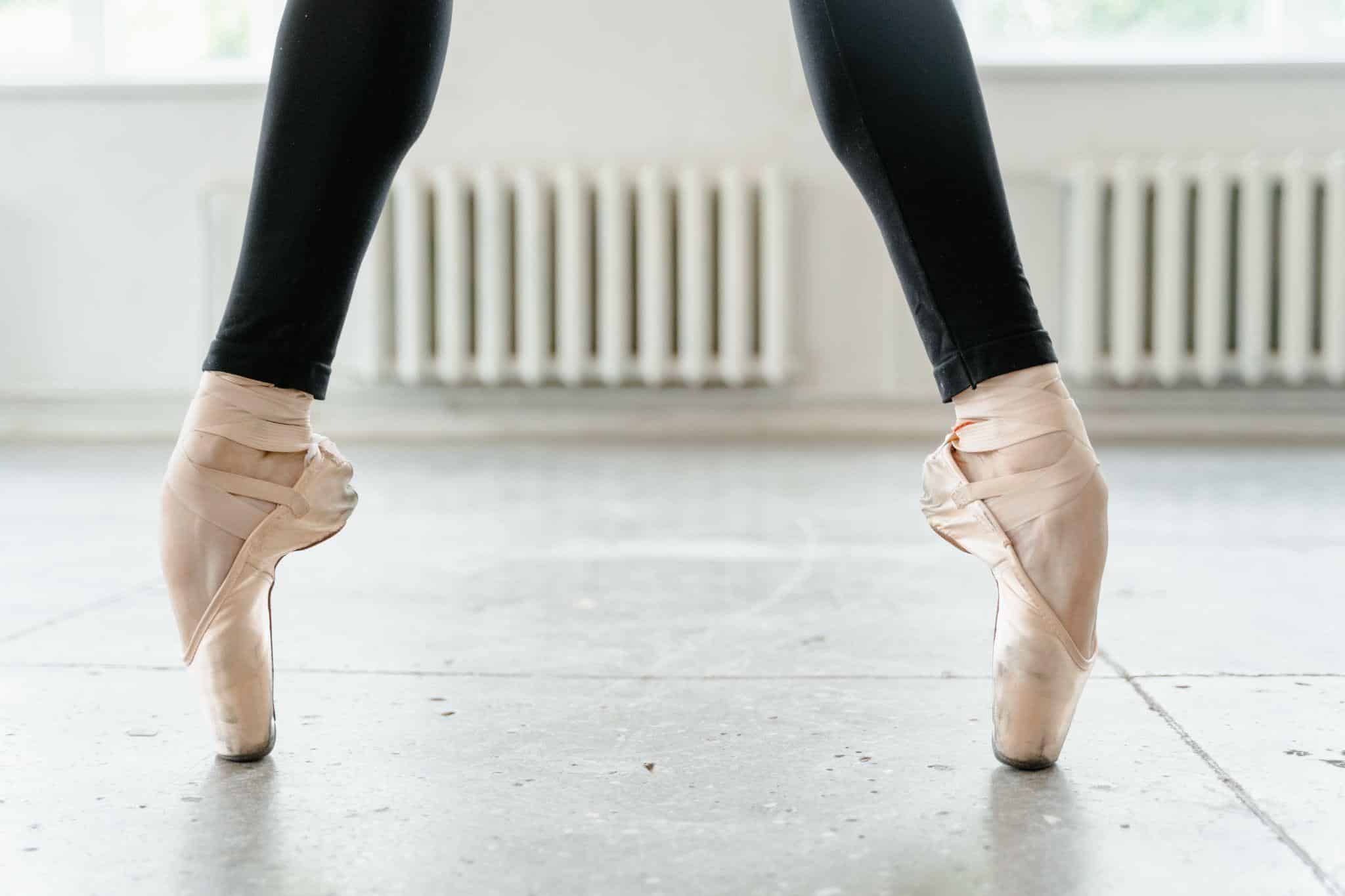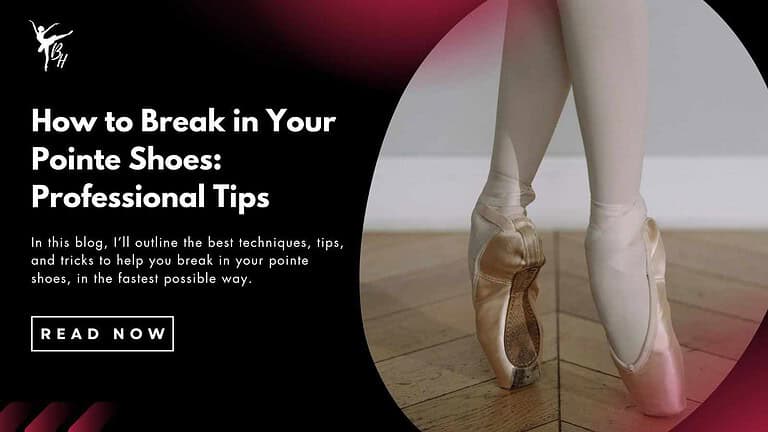The 5 Best Pointe Shoe Brands of 2023
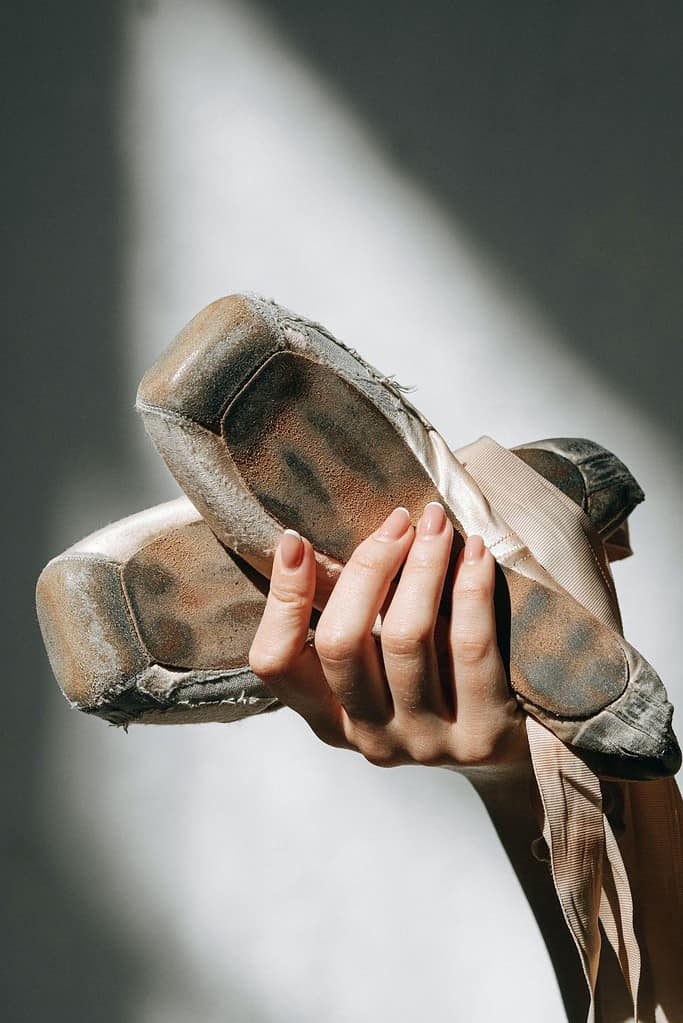
It can be pretty daunting knowing which pointe shoe brand to choose. Especially if you’ve seen all the dance movies with horrible blistered and bloody ballerina feet.
Any normal person would say ‘No thank you, that’s not for me’.
Spoiler Alert: Dancers have to be a little bit crazy to inflict such torture.
But don’t be scared. It’s an incredibly exciting moment.
I still remember sleeping with my brand new Blochs under my pillow and coming home every day after school, slipping them on, and dancing in my kitchen.
As dancers, we understand that pointe shoes are more than just footwear. But not every pointe shoe is the same.
So what is the perfect pointe shoe brand and how do you choose it?
The perfect pointe shoe acts as your gateway to a mesmerising world of grace and beauty.
It’s the one that gives you that extra ‘oomph’ and confidence to perform at your best.
In this blog post, I will guide you through the process of selecting the perfect point shoe brand, and help you decide which one is best for you. Let’s go shopping.
I’ll address all your pointe shoe inquiries; including brand selection, style, advantages, and weaknesses, and take you one step closer to finding your perfect fit.
Best All Round
Nikolay/ Grishko 2007
Best for Shorter Toes
Bloch Heritage
Best for Beginners
Capezio Ava
Best for Durability
Gaynor Minden
Best for Professionals
Freed Classic
The 5 Best Pointe Shoe Brands (2023)
WHAT ARE THE BEST POINTE SHOE BRANDS?
The best pointe shoe brands vary based on your specific needs as a dancer and the shape and strength of your feet.
It’s not a one-size-fits-all or as your parents might say, ‘you’ll grow into them‘.
As a beginner or student in training, pointe shoe brands like Bloch, Grishko, and Capezio have consistently proven to be reliable choices, providing comfort and support.
As you further progress in your training and dance career, pointe shoe brands like Freed (for aesthetics), and Gaynor Minden (for durability and shock absorbency), become noteworthy.
With that in mind, our recommendation for the best all-round pointe shoe brand is GRISHKO 2007.
NIKOLAY/GRISHKO 2007 – BEST ALL ROUND POINTE SHOE
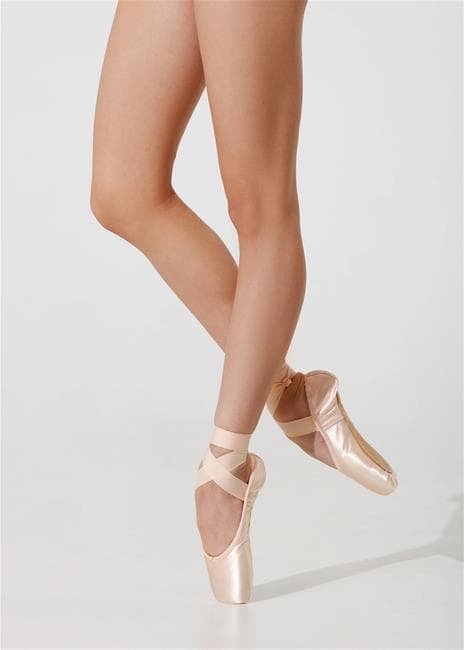
BLOCH HERITAGE – BEST FOR SHORTER TOES
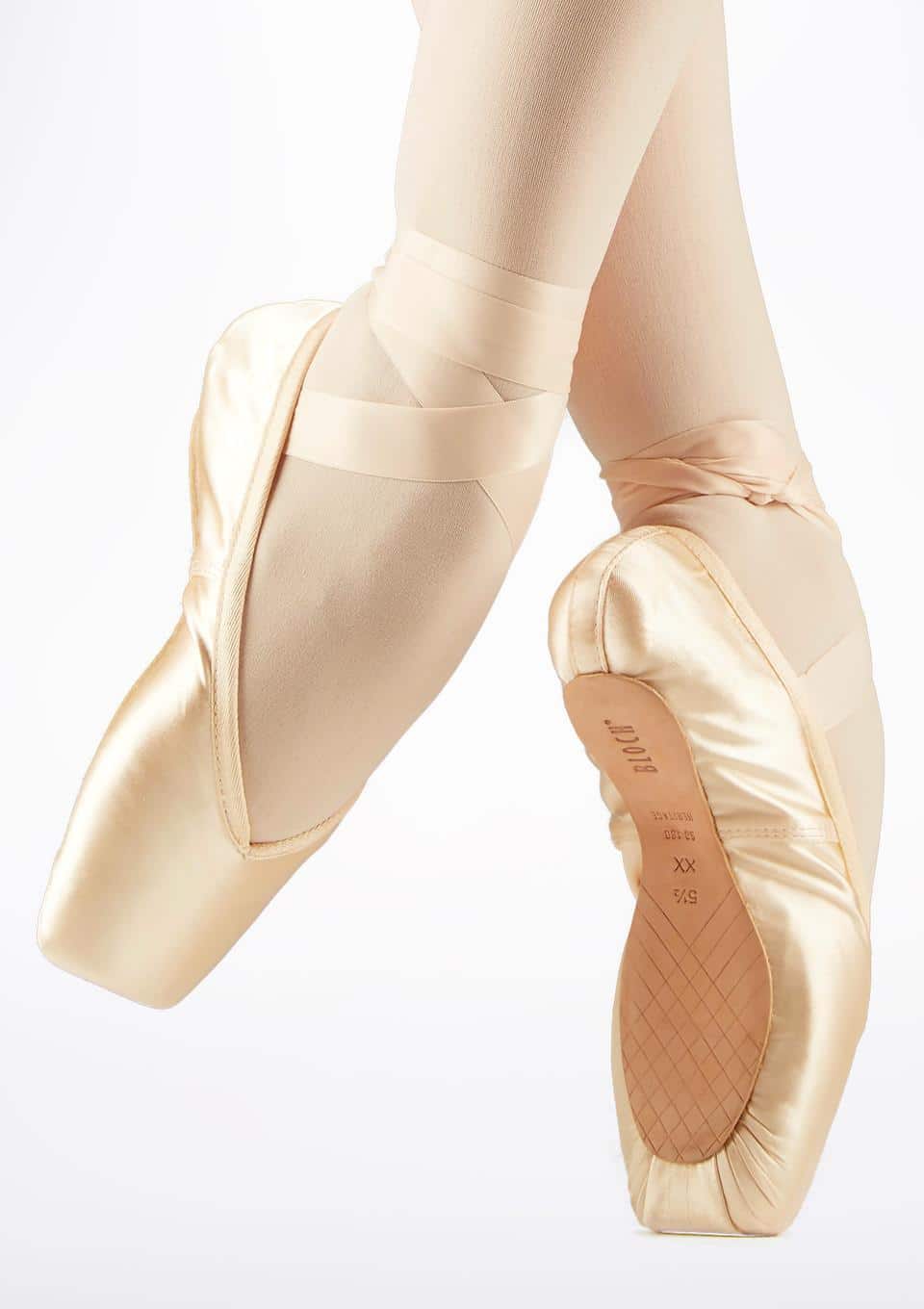
CAPEZIO AVA – BEST FOR BEGINNERS
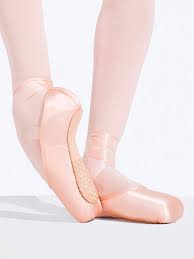
GAYNOR MINDEN – BEST FOR DURABILITY
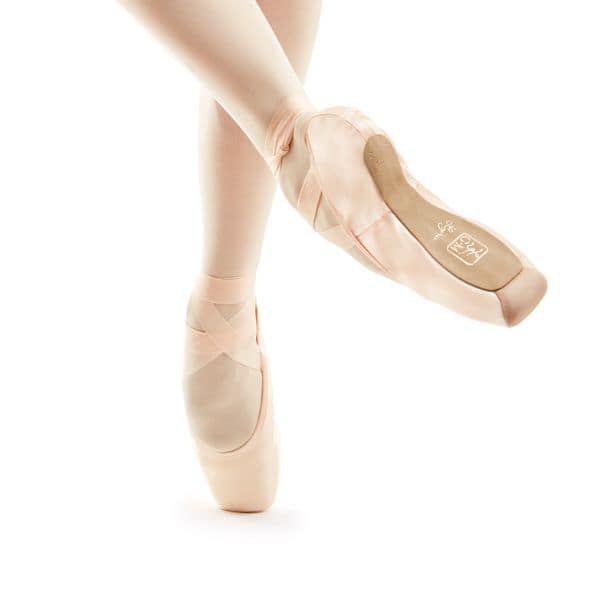
FREED CLASSIC – BEST FOR PROFESSIONALS
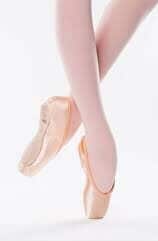
FREE POINTE SHOE GUIDE
Feeling ready?
One last thing before you go shopping for those beautiful silky satin toe slippers. It’s a good idea to understand how a pointe shoe is designed.
That is the anatomy of a pointe shoe.
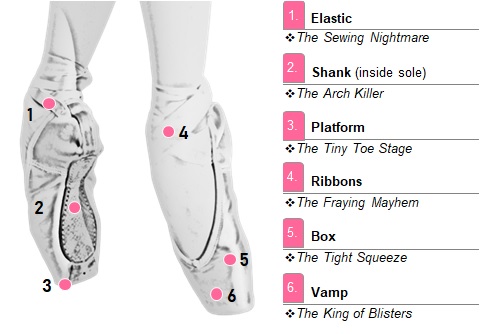
BOX
The front part of the shoe that encloses a dancer’s toes and provides a platform. Usually comes in three distinct shapes:
- Tapered: best for those with narrow/Egyptian feet
- Slightly tapered: best for average size feet, peasant, or Greek shape toes
- Square: best for those with wide metatarsals.
PLATFORM
The hard, flat surface at the tip of the shoe provides the base to stand on pointe. Usually, it comes in narrow or wide.
SHANK
The rigid, flat piece inside the shoe’s sole that runs from the heel to the platform.
Usually comes in soft, medium, hard, and of varying lengths (full, ¾, or half shank).
VAMP
Part of the shoe that covers the top of a dancer’s toes, varying in shape.
- V-Cut Shape: more streamlined and elegant look
- U-Cut Shape: more contemporary look
- Length: high, mid, or low depending on the length of the toes.
HEEL
Provides support to the back of the foot and helps maintain proper alignment while on pointe.
Comes in high or low depending on whether you have a narrow or wide heel.
RIBBONS AND ELASTICS
Items sewn onto the pointe shoe to secure the shoe to your foot and ankle.
CHOOSING THE RIGHT POINTE SHOE BRAND
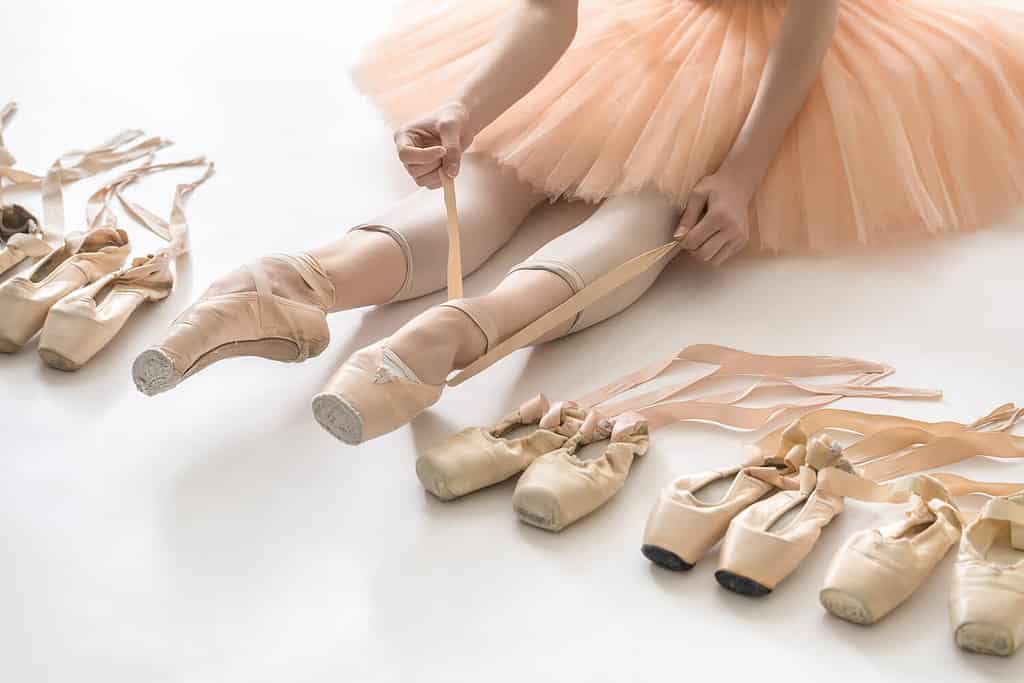
FOOT SHAPE
Make sure to examine the shoe’s structure.
Focus on key aspects such as the box, vamp, and heel height, and make sure these things suit your particular toe and foot shape.
FOOT STRENGTH
Look at the shoe´s firmness level or shank, which often ranges from extra soft to extra hard.
If you have highly flexible arches, you may lean towards a shoe that provides more support.
On the other hand, you may opt for a softer shoe to help develop better articulation and strength, instead of relying on the shoe itself to maintain support.
SPECIFIC NEEDS
The first thing is first.
What’s the purpose of your pointe shoe? Is it for Class? Rehearsals? Performances?
Answering this question plays a pivotal role in determining the most suitable pointe shoe.
Did you know, custom-made shoes can be an option too?
This is a great option if you have a preference for a particular brand or style, but need specific modifications (ie. increasing the vamp length, or changing the length of the sole).
TOP 3 POINTE SHOE CARE AND MAINTENANCE TIPS
ROTATE YOUR POINTE SHOES
Rotating between multiple pairs of pointe shoes allows each pair to fully dry out between use; preventing excessive wear and extending their lifespan.
SHELLAC, JET GLUE, AND DARNING
Using items like shellac, jet glue and even darning your shoes can extend their durability by strengthening areas prone to softening.
This prevents damage to the platform and can help to maintain proper alignment on pointe.
SHOE CARE
Try to leave your pointe shoes outside of a bag, remove any toe pads, trim any fraying on the platform, and treat them with the love they deserve.
BEST POINTE SHOE BRANDS OF 2023 – FAQs
ARE POINTE SHOES BAD FOR YOUR FEET?
Pointe shoes put immense pressure on your toes and ankles and can lead to various issues like blisters, calluses, bunions, and even more serious injuries.
It’s crucial to find the right shoe and maintain proper hygiene to minimise these problems.
Additionally, using accessories like toe pads, toe spacers, second skin, and toe tape, can be essential in protecting your feet from damage.
Trust me, nobody wants 80-year-old-looking toes when they’re 20!
WHICH POINTE SHOE BRAND IS BEST FOR WIDE FEET?
Every brand of pointe shoe will generally provide an option for wider feet. What may work best for one dancer may not suit another.
If width is important for you, try looking for a pointe shoe that has a square-shaped box. This will give you a wider platform.
Don’t be afraid to try different pointe shoe brands until you find one that works for you.
Sometimes it really is just a matter of trial and error.
CAN I PURCHASE POINTE SHOES ONLINE, OR IS IT BEST TO VISIT A PHYSICAL STORE?
It’s generally recommended to have a pointe shoe fitting from a trained professional in the store.
I’d recommend this approach if it’s your first time or if you´re looking to try different styles or brands.
However, if you ́re experienced and know what you ́re looking for, or you’re just ordering the same style of shoe, save yourself some time and order online.
HOW DO I KNOW WHEN TO REPLACE MY POINTE SHOES?
It’s generally a good indication that your pointe shoes need replacing when you begin to notice things such as:
Pointe shoe durability can vary widely, with some shoes lasting dancers months, whilst others may only last weeks.
The answer is, it depends.
HOW MUCH ARE GOOD QUALITY POINTE SHOES?
Ahhh! Pointe shoes can be expensive. Prices typically range from $90 to $170.
What’s worse, it’s not uncommon to go through as many as three pairs in a single month.
I found that transitioning from Bloch to Gaynor Minden was primarily driven by cost-effectiveness.
Gaynors are made with durable and resilient materials and usually last three to five times longer than the normal pointe shoe.
WRAP UP
Always keep in mind that if you´re uncertain about what pointe shoe is best for you, seek guidance and assistance from a trained professional in a store.
As your technique, strength, and articulation evolve, so too may your choice of pointe shoe.
It’s important to note that even if your pointe shoes fit correctly, they can still be painful.
Wait, what?
This is why dancers undergo rigorous training to build the necessary strength, technique, and endurance to minimise discomfort and prevent injuries.
Pointe shoes are like onions. They have layers, and sometimes, they can make you cry (think Natalie Portman in Black Swan).
